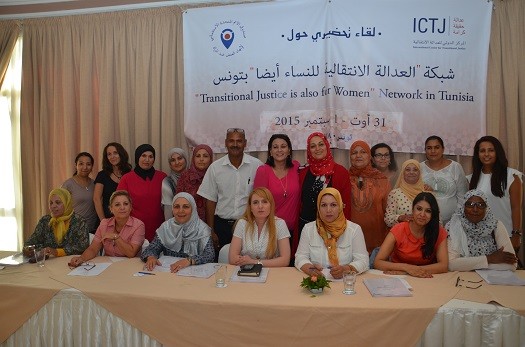In collaboration with 11 Tunisian human rights organizations from nine regions, ICTJ recently established the network “Transitional Justice is also for Women” to engage women as active participants in transitional justice initiatives.
While the transitional justice process in Tunisia has faced several impediments and challenges, women are one of the strongest forces pushing for justice, truth, and reparations since the 2011 revolution. “Transitional Justice is also for Women” is the culmination of extensive work ICTJ has been conducting with women’s groups in the country since 2014 to ensure that women are equally involved in transitional justice processes and that their specific needs and experiences of violence are effectively addressed.
“We have spent the past year discussing the benefits of transitional justice with women and highlighting the barriers to their participation in the process,” says Salwa el Gantri, Gender Program Associate in ICTJ’s Tunisia office.
The Transitional Justice Law, passed in December 2013, envisioned the creation of a Truth and Dignity Commission (TDC), among other initiatives, to confront 23 years of abuses under Ben Ali’s dictatorship—in addition to human rights violations since 1955. The TDC’s role is to uncover the truth about various violations, identify the causes and responsibilities, and provide reparation and rehabilitation for victims to achieve national reconciliation.
However, women were not adequately included as active participants in the process following the creation of the TDC, and have therefore been unable to ensure their deserved status.
“The TDC should further enhance women’s participation in the process and help them coming forward to shed the light on the violations they were victims of via their testimonies,” says El-Gantri.
El-Gantri and Kelli Muddell, Director of ICTJ’s Gender Justice Program, have worked closely with local organizations to put together the structure of the goals, methodology, and activities of the network, which would be launched in October in Tunis, Sfax, Kasserine, and Sidi Bouzid.
“ICTJ will continue its support for women’s efforts and initiatives on the ground, particularly outside the capital and in the marginalized regions. The significance of the network lies in its capacity to mobilize women in such areas and facilitate experience and information sharing,” said Kelli Muddell.
Similar to other contexts, Tunisian women who were victims of sexual abuse hesitate to share their stories because of the fear of social stigma. Besides shedding light on women’s roles in revealing truths about the dark history of the dictatorship, the “Transitional Justice is also for Women” network aims to offer practical suggestions to create a favorable environment that motivates women to testify in front of the TDC and ensures that their experiences are included. Furthermore, it seeks to expose various violations against women,including violations related to economic and social rights and sexual violence, by time period and the nature of the perpetrators.
PHOTO: Participants of the meeting of the newly established network held in Tunis on 31 August. (Mokdad Chaouachi)
